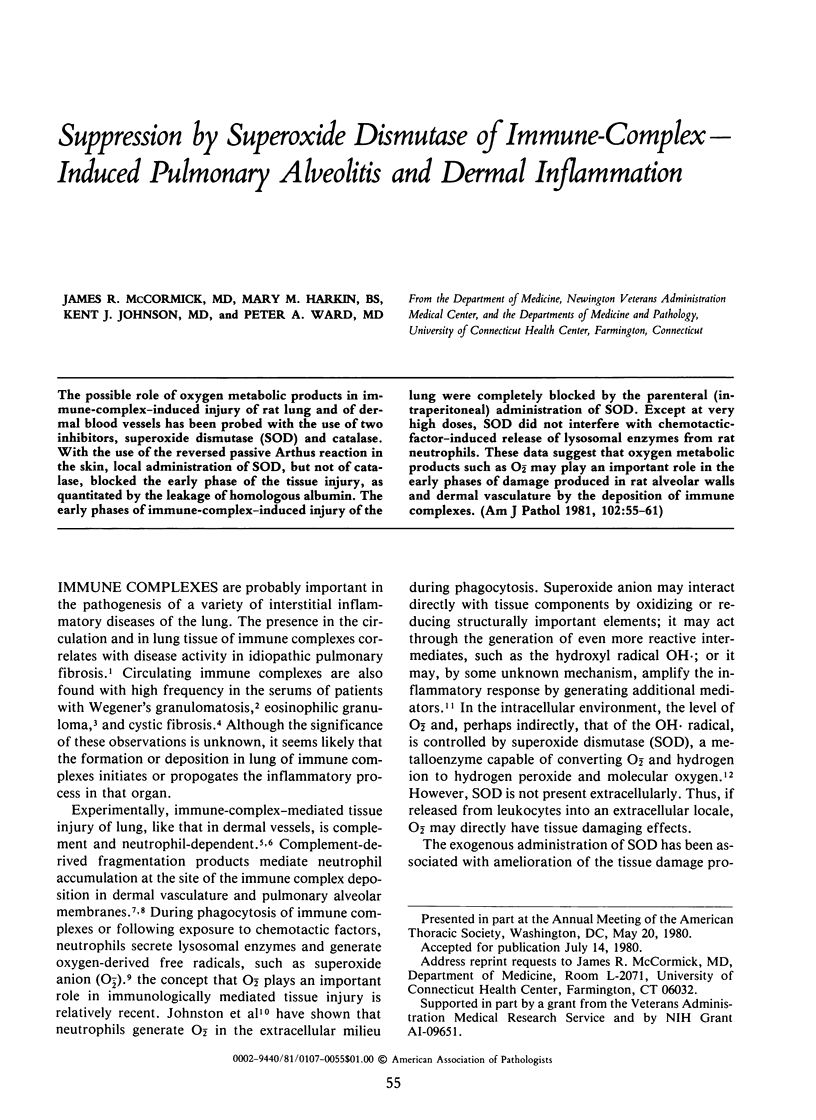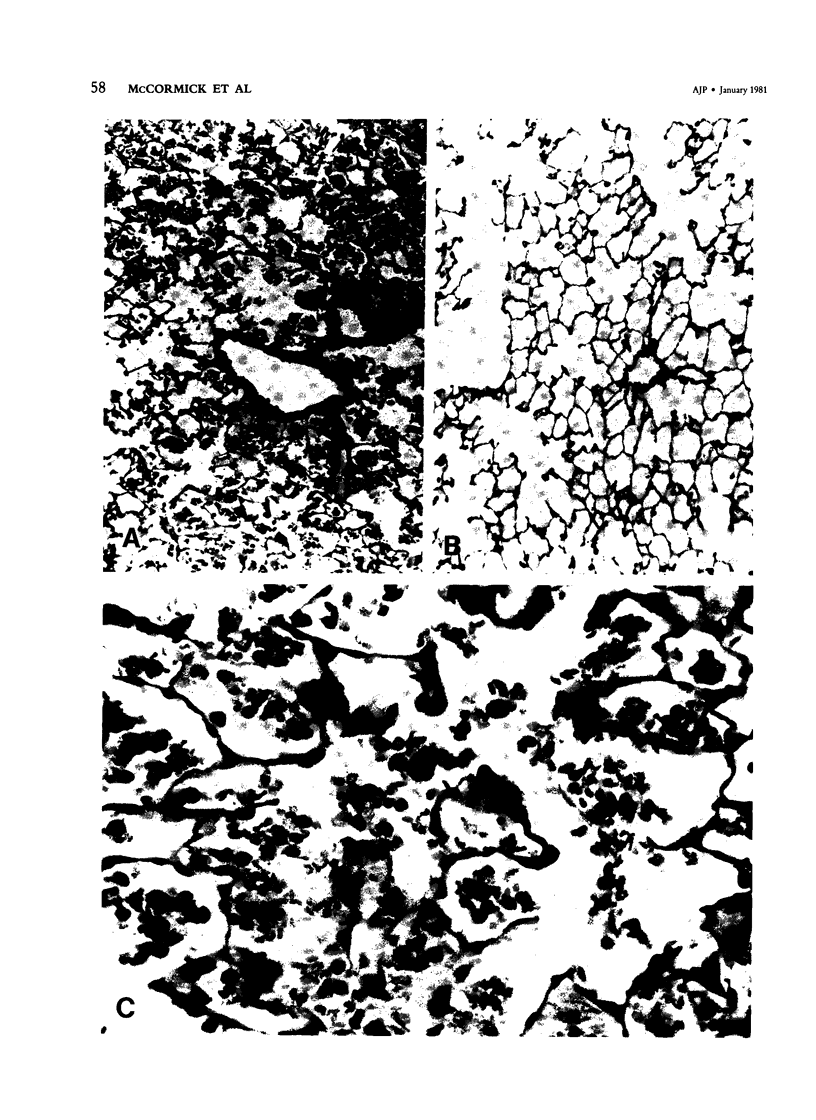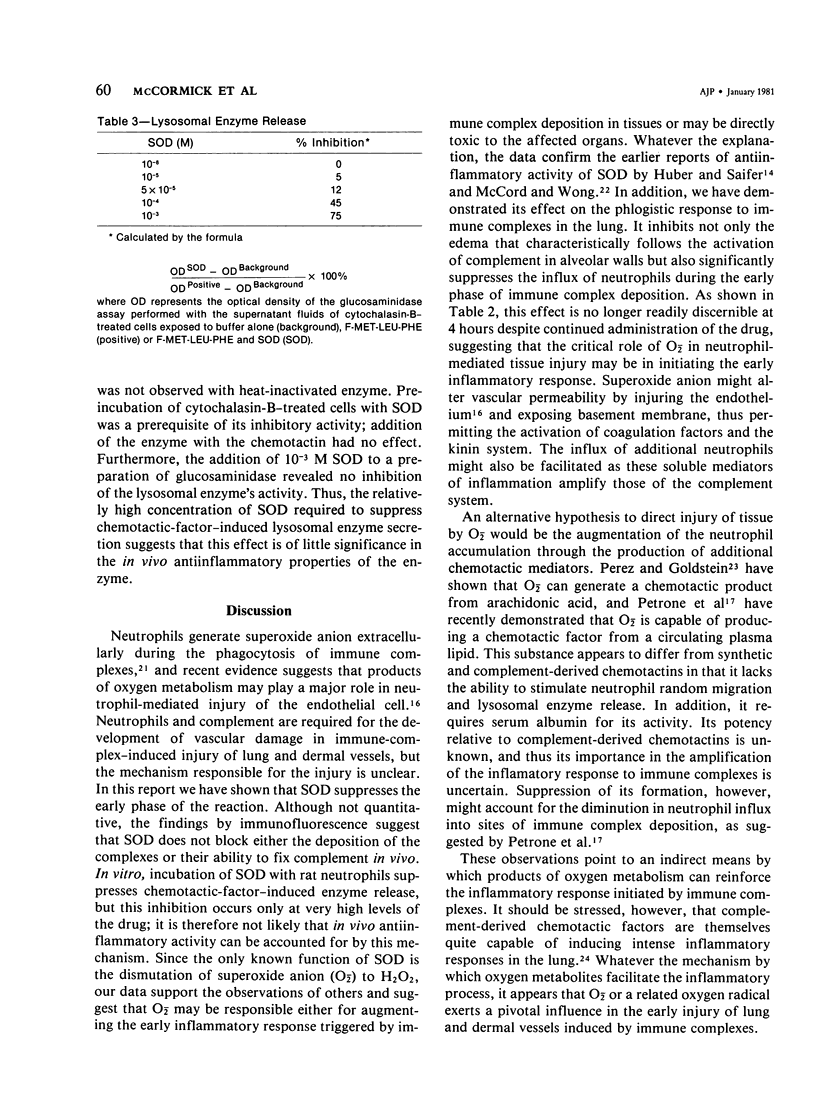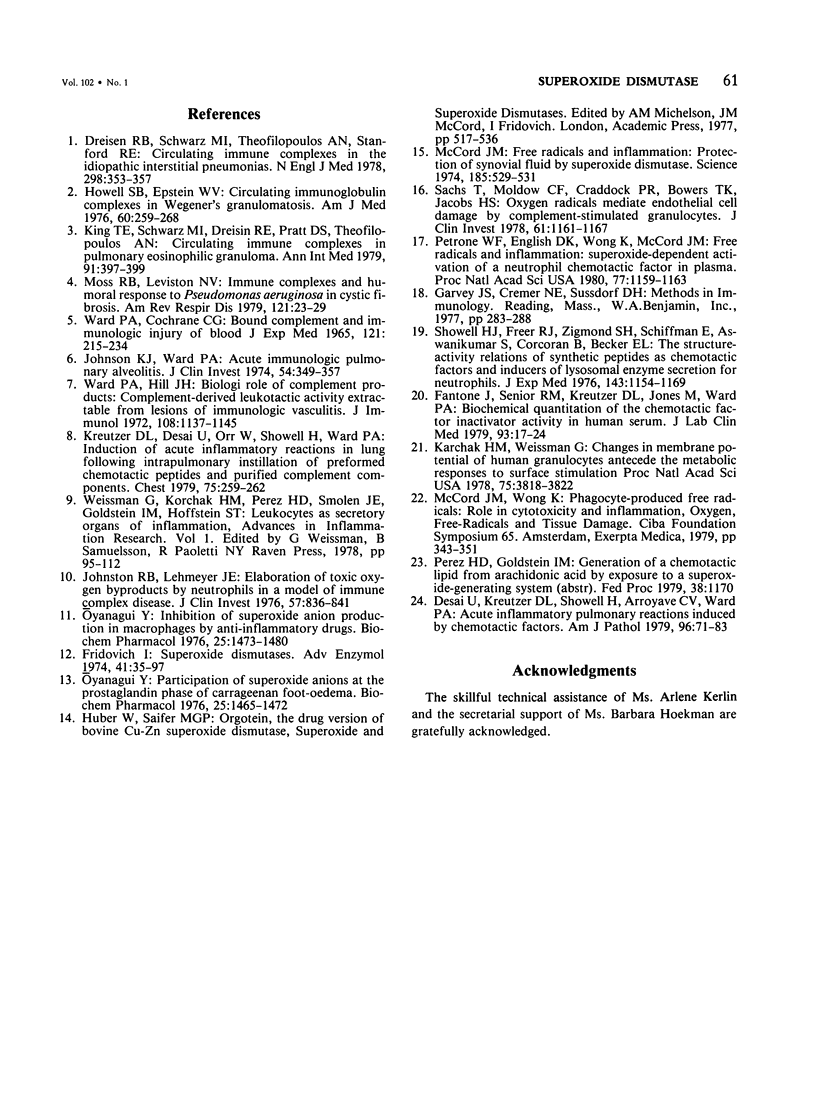Abstract
The possible role of oxygen metabolic products in immune-complex--induced injury of rat lung and of dermal blood vessels has been probed with the use of two inhibitors, superoxide dismutase (SOD) and catalase. With the use of the reversed passive Arthus reaction in the skin, local administration of SOD, but not of catalase, blocked the early phase of the tissue injury, as quantitated by the leakage of homologous albumin. The early phases of immune-complex--induced injury of the lung were completely blocked by the parenteral (intraperitoneal) administration of SOD. Except at very high doses, SOD did not interfere with chemotactic-factor--induced release of lysosomal enzymes from rat neutrophils. These data suggest that oxygen metabolic products such as O(2-) may play an important role in the early phases of damage produced in rat alveolar walls and dermal vasculature by the deposition of immune complexes.
Full text
PDF






Images in this article
Selected References
These references are in PubMed. This may not be the complete list of references from this article.
- Desai U., Kreutzer D. L., Showell H., Arroyave C. V., Ward P. A. Acute inflammatory pulmonary reactions induced by chemotactic factors. Am J Pathol. 1979 Jul;96(1):71–83. [PMC free article] [PubMed] [Google Scholar]
- Dreisin R. B., Schwarz M. I., Theofilopoulos A. N., Stanford R. E. Circulating immune complexes in the idiopathic interstitial pneumonias. N Engl J Med. 1978 Feb 16;298(7):353–357. doi: 10.1056/NEJM197802162980701. [DOI] [PubMed] [Google Scholar]
- Fantone J., Senior R. M., Kreutzer D. L., Jones M., Ward P. A. Biochemical quantitation of the chemotactic factor inactivator activity in human serum. J Lab Clin Med. 1979 Jan;93(1):17–24. [PubMed] [Google Scholar]
- Fridovich I. Superoxide dismutases. Adv Enzymol Relat Areas Mol Biol. 1974;41(0):35–97. doi: 10.1002/9780470122860.ch2. [DOI] [PubMed] [Google Scholar]
- Howell S. B., Epstein W. V. Circulating immunoglobulin complexes in Wegener's granulomatosis. Am J Med. 1976 Feb;60(2):259–268. doi: 10.1016/0002-9343(76)90435-6. [DOI] [PubMed] [Google Scholar]
- Johnson K. J., Ward P. A. Acute immunologic pulmonary alveolitis. J Clin Invest. 1974 Aug;54(2):349–357. doi: 10.1172/JCI107770. [DOI] [PMC free article] [PubMed] [Google Scholar]
- Johnston R. B., Jr, Lehmeyer J. E. Elaboration of toxic oxygen by-products by neutrophils in a model of immune complex disease. J Clin Invest. 1976 Apr;57(4):836–841. doi: 10.1172/JCI108359. [DOI] [PMC free article] [PubMed] [Google Scholar]
- King T. E., Jr, Schwarz M. I., Dreisin R. E., Pratt D. S., Theofilopoulos A. N. Circulating immune complexes in pulmonary eosinophilic granuloma. Ann Intern Med. 1979 Sep;91(3):397–399. doi: 10.7326/0003-4819-91-3-397. [DOI] [PubMed] [Google Scholar]
- Korchak H. M., Weissmann G. Changes in membrane potential of human granulocytes antecede the metabolic responses to surface stimulation. Proc Natl Acad Sci U S A. 1978 Aug;75(8):3818–3822. doi: 10.1073/pnas.75.8.3818. [DOI] [PMC free article] [PubMed] [Google Scholar]
- Kreutzer D. L., Desai U., Orr W., Showell H., Ward P. A. Induction of acute inflammatory reactions in lung following intrapulmonary instillation of preformed chemotactic peptides and purified complement components. Chest. 1979 Feb;75(2 Suppl):259–262. doi: 10.1378/chest.75.2_supplement.259. [DOI] [PubMed] [Google Scholar]
- McCord J. M. Free radicals and inflammation: protection of synovial fluid by superoxide dismutase. Science. 1974 Aug 9;185(4150):529–531. doi: 10.1126/science.185.4150.529. [DOI] [PubMed] [Google Scholar]
- Moss R. B., Lewiston N. J. Immune complexes and humoral response to Pseudomonas aeruginosa in cystic fibrosis. Am Rev Respir Dis. 1980 Jan;121(1):23–29. doi: 10.1164/arrd.1980.121.1.23. [DOI] [PubMed] [Google Scholar]
- Oyanagui Y. Inhibition of superoxide anion production in macrophages by anti-inflammatory drugs. Biochem Pharmacol. 1976 Jul 1;25(13):1473–1480. doi: 10.1016/0006-2952(76)90063-0. [DOI] [PubMed] [Google Scholar]
- Oyanagui Y. Participation of superoxide anions at the prostaglandin phase of carrageenan foot-oedema. Biochem Pharmacol. 1976 Jul 1;25(13):1465–1472. [PubMed] [Google Scholar]
- Petrone W. F., English D. K., Wong K., McCord J. M. Free radicals and inflammation: superoxide-dependent activation of a neutrophil chemotactic factor in plasma. Proc Natl Acad Sci U S A. 1980 Feb;77(2):1159–1163. doi: 10.1073/pnas.77.2.1159. [DOI] [PMC free article] [PubMed] [Google Scholar]
- Sacks T., Moldow C. F., Craddock P. R., Bowers T. K., Jacob H. S. Oxygen radicals mediate endothelial cell damage by complement-stimulated granulocytes. An in vitro model of immune vascular damage. J Clin Invest. 1978 May;61(5):1161–1167. doi: 10.1172/JCI109031. [DOI] [PMC free article] [PubMed] [Google Scholar]
- Showell H. J., Freer R. J., Zigmond S. H., Schiffmann E., Aswanikumar S., Corcoran B., Becker E. L. The structure-activity relations of synthetic peptides as chemotactic factors and inducers of lysosomal secretion for neutrophils. J Exp Med. 1976 May 1;143(5):1154–1169. doi: 10.1084/jem.143.5.1154. [DOI] [PMC free article] [PubMed] [Google Scholar]
- WARD P. A., COCHRANE C. G. BOUND COMPLEMENT AND IMMUNOLOGIC INJURY OF BLOOD VESSELS. J Exp Med. 1965 Feb 1;121:215–234. doi: 10.1084/jem.121.2.215. [DOI] [PMC free article] [PubMed] [Google Scholar]
- Ward P. A., Hill J. H. Biologic role of complement products. Complement-derived leukotactic activity extractable from lesions of immunologic vasculitis. J Immunol. 1972 May;108(5):1137–1145. [PubMed] [Google Scholar]




